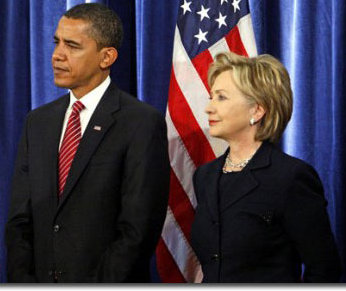From Mark Landler and Steven Erlanger (2011-02-05), Obama Backs Suleiman-Led Transition, at truthout:

Munich — The Obama administration on Saturday formally threw its weight behind a gradual transition in Egypt, backing attempts by the country's vice president, Gen. Omar Suleiman, to broker a compromise with opposition groups and prepare for new elections in September.
Secretary of State Hillary Rodham Clinton, speaking to a conference here, said it was important to support Mr. Suleiman as he seeks to defuse street protests and promises to reach out to opposition groups, including the Muslim Brotherhood. Administration officials said earlier that Mr. Suleiman and other military-backed leaders in Egypt are also considering ways to provide President Hosni Mubarak with a graceful exit from power.
That takes some time,
Mrs. Clinton said. There are certain things that have to be done in order to prepare.
— Mark Landler and Steven Erlanger (2011-02-05), Obama Backs Suleiman-Led Transition, at truthout
Indeed! For example:
Nor has Mr. Suleiman, a former general, former intelligence chief and Mr. Mubarak's longtime confidant, yet reached out to the leaders designated by the protesters to negotiate with the government, opposition groups said.
Instead of loosening its grip, the existing government appeared to be consolidating its power: The prime minister said police forces were returning to the streets, and an army general urged protesters to scale back their occupation of Tahrir Square.
. . .
In Tahrir Square, meanwhile, the military tightened its cordon around the protesters by reinforcing security checks at all the entrances.
— Kareem Fahim, Mark Landler and Anthony Shadid (2011-02-05), West [sic] Backs Gradual Egyptian Transition, New York Times
At home and abroad, the more things Change….
Elsewhere in the Times story, there’s this:
Protesters interpreted the simultaneous moves by the Western leaders and Mr. Suleiman as a rebuff to their demands for an end to the dictatorship led for almost three decades by Mr. Mubarak, a pivotal American ally[] and pillar of the existing order in the Middle East.
Just days after President Obama demanded publicly that change in Egypt must begin right away, many in the streets accused the Obama administration of sacrificing concrete steps toward genuine change in favor of a familiar stability.
America doesn't understand,
said Ibrahim Mustafa, 42, who was waiting to enter Tahrir Square. The people know it is supporting an illegitimate regime.
— Kareem Fahim, Mark Landler and Anthony Shadid (2011-02-05), West [sic] Backs Gradual Egyptian Transition, New York Times
Of course Mr. Mustafa is right that that is what America
— meaning the United States government — is doing. But I’m afraid I can’t agree with him if he blames it on the cluelessness or naïveté of Mr. Obama and his government. It’s not that they don’t understand what the people in Tahrir Square want and expect; it’s that they don’t care. The primary allies of governments are always other governments — because the first and most important commitment of any government is to government, just as such, and maintained at any cost.
See also:
